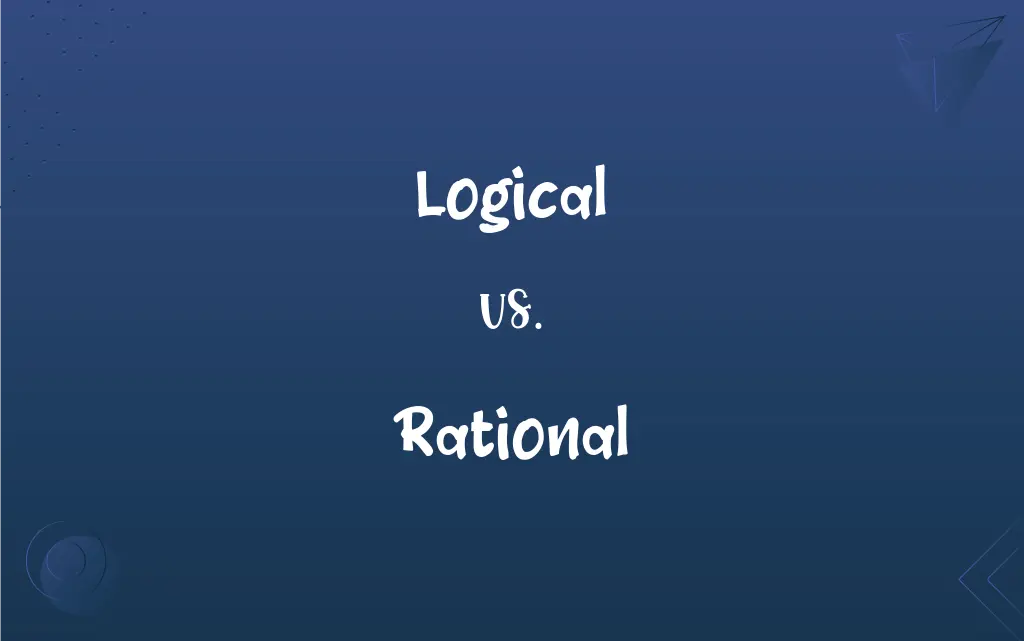Logical vs. Rational: What's the Difference?
Edited by Janet White || By Harlon Moss || Published on January 29, 2024
Logical refers to reasoning based on strict principles of validity, while rational involves reasoning based on sound judgment and practicality.

Key Differences
Logical reasoning strictly adheres to the rules of logic, such as deduction and induction, often used in mathematics and philosophy. Rational reasoning, while also logical, incorporates practicality and emotional intelligence, considering what is reasonable in a given context.
Logical decision-making relies heavily on structured arguments and established principles, often devoid of emotional considerations. Rational decision-making, however, balances logical reasoning with emotional and practical factors, aiming for decisions that are sensible in real-world situations.
Logical processes are often applied in scenarios requiring stringent proof and structure, like scientific theories and mathematical problems. Rational processes are used in everyday decision-making, where practicality and feasibility are as important as logical correctness.
Logical thought is more rigid, sticking to formal rules of reasoning. Rational thought is more flexible, adapting to the nuances of different situations, including subjective and emotional aspects.
Logical reasoning is largely objective, focusing on factual and provable elements. Rational reasoning, while grounded in logic, also considers subjective elements like beliefs, values, and personal experiences.
ADVERTISEMENT
Comparison Chart
Basis of Reasoning
Strict principles of validity and deduction
Sound judgment, including practical and emotional factors
Emotional Consideration
Often excludes emotional aspects
Incorporates emotional intelligence
Flexibility
Rigid and structured
Adaptable to real-world contexts
Application
Used in formal and theoretical contexts
Used in practical and everyday decision-making
Objective vs. Subjective
Mostly objective
Balances objective and subjective factors
ADVERTISEMENT
Logical and Rational Definitions
Logical
In accordance with the principles of logic.
The solution was logical, fitting all the given premises.
Rational
Based on or in accordance with reason or logic.
Her decision to save money was rational and wise.
Logical
Pertaining to or based on formal logic.
A logical argument follows clear, reasoned steps.
Rational
Consistent with or based on reason.
His explanation was rational and convincing.
Logical
Valid within the framework of logical reasoning.
His hypothesis was logical but needed empirical testing.
Rational
Exhibiting sound judgment.
It was a rational move to consult experts.
Logical
Characterized by clear, sound reasoning.
Her conclusion was logical, considering all the evidence.
Rational
Capable of logical, reasonable thinking.
A rational mind evaluates both pros and cons.
Logical
Systematic and orderly.
The book’s structure was logical and easy to follow.
Rational
Sensible and realistic in approach.
Choosing a close destination for the trip was a rational choice.
Logical
Of, relating to, in accordance with, or of the nature of logic
Logical disputation.
Rational
Having or exercising the ability to reason.
Logical
Based on earlier or otherwise known statements, events, or conditions; reasonable
Rain was a logical expectation, given the time of year.
Rational
Consistent with or based on reason or good judgment; logical or sensible
Rational decisions.
FAQs
What does logical mean?
Logical refers to reasoning in line with strict principles of validity.
What is the meaning of rational?
Rational means reasoning based on sound judgment and practicality.
Can a decision be logical but not rational?
Yes, if it strictly follows logic but ignores practical or emotional factors.
Is rational thinking always logical?
Rational thinking is usually logical but also considers practicality and emotions.
How do logical and rational reasoning differ in problem-solving?
Logical reasoning is strict and structured, while rational reasoning is more adaptable and considers practicality.
Can emotions play a role in rational decision-making?
Yes, rational decisions often incorporate emotional intelligence.
Is it important to be both logical and rational?
Yes, combining logical with rational thinking often leads to well-rounded decisions.
Is rational thinking subjective?
Rational thinking can have subjective elements, like personal values.
Can a logical conclusion be impractical?
Yes, if it strictly follows logic without considering real-world applicability.
What’s an example of rational thinking?
Choosing a job that balances career goals with personal well-being.
How is logical thinking used in science?
Logical thinking is used to form hypotheses and theories based on empirical evidence.
Are all logical statements true?
Logical statements are valid within their logical structure, but their truth depends on the accuracy of their premises.
Do logical arguments always lead to correct conclusions?
Logical arguments lead to valid conclusions within their premises, but the premises themselves need to be true.
Do rational choices always make logical sense?
Rational choices usually make logical sense but also factor in real-world practicality.
What is an example of logical reasoning?
Using deductive reasoning to derive a conclusion from general principles.
Can logical reasoning be learned?
Yes, logical reasoning skills can be developed through practice and education.
Why is rational thinking important in everyday life?
It helps in making decisions that are sensible and suitable for real-life situations.
Can logic be applied to emotions?
Logic can analyze emotional responses but doesn't govern how emotions are felt.
How does rational thinking benefit decision-making?
It leads to decisions that are both reasonable and practical.
Does rational thinking evolve over time?
Yes, rational thinking can evolve with experience and changing circumstances.
About Author
Written by
Harlon MossHarlon is a seasoned quality moderator and accomplished content writer for Difference Wiki. An alumnus of the prestigious University of California, he earned his degree in Computer Science. Leveraging his academic background, Harlon brings a meticulous and informed perspective to his work, ensuring content accuracy and excellence.
Edited by
Janet WhiteJanet White has been an esteemed writer and blogger for Difference Wiki. Holding a Master's degree in Science and Medical Journalism from the prestigious Boston University, she has consistently demonstrated her expertise and passion for her field. When she's not immersed in her work, Janet relishes her time exercising, delving into a good book, and cherishing moments with friends and family.































































